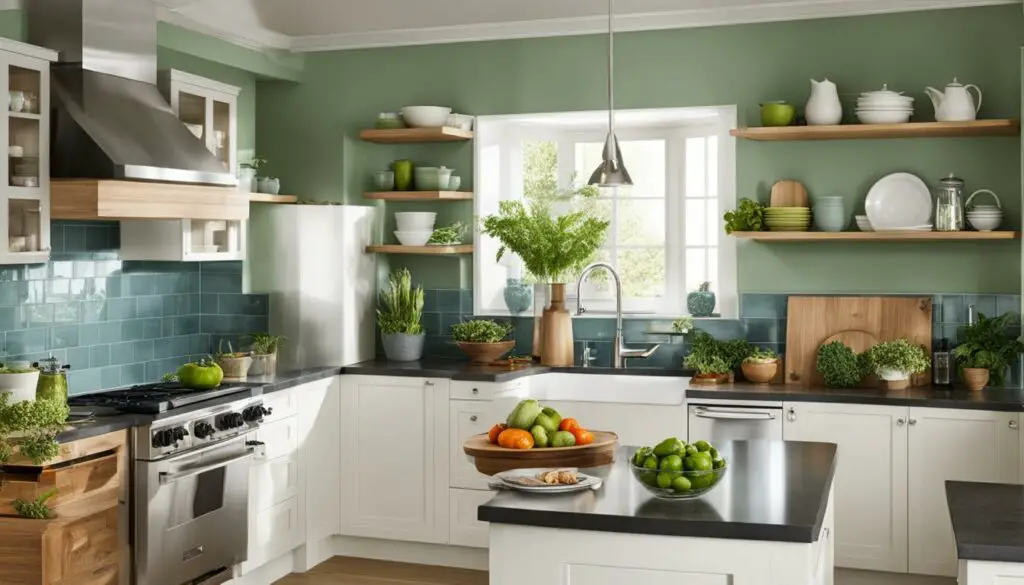Are you feeling overwhelmed or stressed in your living space? Do you want to create a more harmonious and balanced environment? Look no further than the ancient art of Feng Shui. Feng Shui is a Chinese practice that focuses on creating a harmonious environment to promote positive energy flow and well-being. By implementing Feng Shui calculations and techniques, you can transform your home into a sanctuary for your mind, body, and spirit.
In this comprehensive guide, we will take you through the process of calculating Feng Shui effortlessly. We will explore the different calculation methods, formulas, tips, and tricks, as well as the tools you need to bring balance and harmony to your living space. Whether you are a beginner or have experience with Feng Shui, this guide will provide you with the knowledge and resources to approach Feng Shui calculations with ease.
Key Takeaways:
- Learn the basics of Feng Shui and its principles
- Discover the Five Elements theory in Feng Shui calculations
- Understand the importance of the Bagua map in Feng Shui calculations for home
- Explore Feng Shui numerology and compass reading
- Follow a step-by-step guide to calculating Feng Shui in your living space
Understanding Feng Shui: A Brief Overview
Before we dive into the world of Feng Shui calculations, it’s important to understand the basics of Feng Shui. Feng Shui is the ancient Chinese practice of arranging your environment to create harmony and balance in your surroundings. By doing so, you can enhance your well-being, happiness, and success.
At its core, Feng Shui is based on the belief that everything in your environment is interconnected and has an impact on your life. By intentionally arranging your environment, you can create a positive flow of energy, or “chi,” that can improve your life in various ways.
There are several principles of Feng Shui, but one of the most critical is the idea of yin and yang. Yin and yang are opposite forces that are interconnected and complement each other. In Feng Shui, creating a balance between these forces is essential to creating harmony in your environment.
The Five Elements in Feng Shui Calculation
Another key aspect of Feng Shui is the Five Elements theory. This theory involves five elements, including wood, fire, earth, metal, and water, that are believed to interact with each other in different ways. By understanding the interactions between these elements, you can create balance and harmony in your environment.

For example, wood nourishes fire, so a room with many wooden elements can benefit from a fireplace or candles. On the other hand, water extinguishes fire, so a room with many fire elements can benefit from a water feature such as a fountain or aquarium.
Feng Shui Bagua: Dividing Your Space
Another essential tool in Feng Shui calculations is the Bagua map. This map is used to divide your living space into nine areas, each corresponding to different areas of your life, such as career, relationships, and health. By understanding the significance of each area, you can make intentional adjustments to enhance your life in those areas.
The Bagua map is shaped like a tic-tac-toe board, with each section corresponding to a different element, color, and aspect of your life. By aligning these elements in each section, you can create an intentional flow of energy and balance in your living space.
Feng Shui Numerology: Calculating Your Kua Number
Feng Shui numerology is another critical aspect of Feng Shui calculations. Numerology is used to calculate your Kua number, which is believed to influence your personal compatibility and directions for individuals. By understanding your Kua number, you can make adjustments to your environment that align with your personal energy and enhance your well-being.
Feng Shui Compass Reading: Finding the Right Directions
The Feng Shui compass, also known as a Luo Pan, is another tool used in Feng Shui calculations. This compass helps determine auspicious directions for various activities, such as sleeping or working. By aligning your living space with these directions, you can enhance the positive flow of energy and create an environment that supports your well-being.
Feng Shui Formulas for Balancing Energy
Finally, there are various formulas used in Feng Shui calculations that can help balance and enhance the energy flow in your home. These formulas cover everything from auspicious furniture placement to color psychology, and implementing them can have a significant impact on your environment. We’ll explore these formulas in more detail in later sections.
The Five Elements in Feng Shui Calculation
In Feng Shui, everything is connected and influenced by the five elements: Wood, Fire, Earth, Metal, and Water. Each element represents different qualities and is connected to specific aspects of life, such as health, wealth, and relationships. Understanding how the elements interact with one another is crucial to creating a harmonious living space.
| Element | Color | Shape | Area of Influence |
|---|---|---|---|
| Wood | Green and Brown | Rectangle and Vertical | Growth, Change, Creativity |
| Fire | Red, Orange, Purple, Pink | Triangle and Pointed | Passion, Energy, Fame |
| Earth | Yellow and Beige | Square and Flat | Stability, Nourishment, Grounding |
| Metal | White and Gray | Circle and Curved | Clarity, Precision, Strength |
| Water | Blue and Black | Wavy and Irregular | Flow, Abundance, Flexibility |
Each element has a controlling and a nurturing cycle. The controlling cycle shows how one element can weaken or overcome another, while the nurturing cycle shows how one element can support or strengthen another. These cycles are important to consider when analyzing and balancing the energy in your home.
Controlling cycle: Wood weakens Earth, Earth absorbs Water, Water extinguishes Fire, Fire melts Metal, Metal cuts Wood.
Nurturing cycle: Wood feeds Fire, Fire creates Earth, Earth contains Metal, Metal carries Water, Water nourishes Wood.
The Five Elements in Action
When creating a harmonious living space, consider incorporating each element in the following ways:
- Wood: Add plants, wooden furniture, and green or brown accents to encourage growth and creativity.
- Fire: Use candles, lamps, and red or orange accents to promote passion and energy.
- Earth: Add pottery, ceramics, and yellow or beige accents to provide stability and nourishment.
- Metal: Incorporate metal decor, mirrors, and white or gray accents to bring clarity and strength.
- Water: Use fountains, aquariums, and blue or black accents to generate flow and abundance.
By understanding the different elements and how they interact, you can create a balanced and harmonious living space that promotes positive energy and well-being.

Feng Shui Bagua: Dividing Your Space
One of the most critical aspects of Feng Shui calculation for your home is determining the Bagua map, which is a tool used to divide your space into nine sections, each corresponding to a specific area of your life. The Bagua map helps you identify the areas of your home that require more attention and activate specific energies that are essential for your well-being.
The Bagua map is a square-shaped grid that contains nine sections, representing different areas of your life. The center square represents the Health and Well-being area, while the eight surrounding squares are Wealth, Fame, Love and Marriage, Children and Creativity, Helpful People and Travel, Career, Knowledge, and Self-Cultivation. To use the Bagua map effectively in your Feng Shui calculation, you must align it to the entrance of your home.

Once you establish the Bagua map, you can begin implementing Feng Shui calculations for each section of your home. For example, the Wealth area corresponds to the back left corner of your home, and you can enhance this area by placing a money tree or a bowl of coins in this section. Similarly, the Love and Marriage area corresponds to the top right corner of your home, and you can activate this area by placing a pair of pink candles or a romantic photo in this section.
Feng Shui Bagua: Dividing Your Space for Specific Rooms
You can also apply the Bagua map to individual rooms in your home. For example, in your bedroom, the Wealth area corresponds to the far left corner from the entrance, and you can activate this area by placing a small plant or a water feature in this section. Applying the Feng Shui Bagua map to specific rooms can help you create an environment that is conducive to your goals and aspirations.
By understanding and implementing the Bagua map in your Feng Shui calculation, you can create a living space that is harmonious and balanced. The Bagua map is a powerful tool that can help you identify the areas of your life that require attention and activate the energy necessary for your well-being.
Feng Shui Numerology: Calculating Your Kua Number
If you’re looking to enhance your personal energy and align your living space with your goals, calculating your Kua number is essential. Feng Shui numerology uses your birth year to determine your Kua number and provide insight into compatible directions and best areas of your home for personal growth and well-being.
Calculating Your Kua Number
The formula for calculating your Kua number is straightforward and easy to follow:
| Gender | Birth Year | Kua Number |
|---|---|---|
| Male | Add the last two digits of your birth year. If the result is a two-digit number, add them together. Example: 1985 – 8 + 5 = 13 – 1 + 3 = 4 |
|
| Female | Add the last two digits of your birth year. If the result is a two-digit number, add them together. Then, add 5 to the sum. Example: 1985 – 8 + 5 = 13 – 1 + 3 = 4 + 5 = 9 |
Once you’ve calculated your Kua number, refer to a Kua chart to determine your auspicious directions and areas of your home. For instance, if your Kua number is 1, your best directions are South, Southeast, East, and North, while your lucky areas are the Southeast and East.

Keep in mind that your Kua number can change depending on the year, so it’s essential to recalculate it annually and adjust your living space accordingly.
Enhancing Your Living Space with Feng Shui Numerology
Knowing your Kua number and the associated directions can help you create a more harmonious living space. Here are some tips:
- Position your bed, desk, and stove in your favorable directions to enhance personal growth and prosperity.
- Place a water feature or aquarium in your corresponding lucky area to activate positive energy.
- Add elements and colors that correspond to your Kua number to create balance and enhance the auspicious energy in your space.
By incorporating Feng Shui numerology into your living space, you can improve your energy flow and align your surroundings with your goals and aspirations.
Feng Shui Compass Reading: Finding the Right Directions
In Feng Shui, compass readings are used to identify favorable and unfavorable directions for different activities. The Feng Shui compass, also known as the Luo Pan, is an essential tool that helps in determining the auspicious positioning of furniture, doors, and windows.
Learning how to read a Feng Shui compass may seem daunting, but with a little practice, it can be effortless. The first step in using a compass is to determine the facing direction of your home, which is the direction of your front door. Once you have established the facing direction, you can use the compass to find other auspicious directions.
The Different Directions on the Feng Shui Compass
| Direction | Description |
|---|---|
| North | Represents water and career opportunities |
| South | Represents fire and fame |
| East | Represents wood and health |
| West | Represents metal and creativity |
| Northeast | Represents earth and knowledge |
| Northwest | Represents metal and mentors |
| Southeast | Represents wood and wealth |
| Southwest | Represents earth and relationships |
Each direction on the compass has its own unique properties that can be harnessed to bring balance and harmony to your living space. For example, the north direction is associated with water and represents career opportunities, while the southeast direction is associated with wood and represents wealth.
When arranging furniture or choosing colors for a room, it’s important to take into account the Feng Shui compass readings. Placing a desk in the north direction, for example, can enhance career opportunities, while placing a water feature in the southeast direction can attract wealth.

By using the Feng Shui compass, you can create a space that supports and nourishes your goals and aspirations. Whether it’s finding the best direction for a good night’s sleep or enhancing career opportunities, the compass is a valuable tool that can help you achieve balance and harmony in your living space.
Feng Shui Formulas for Balancing Energy
One of the core tenets of Feng Shui is creating a balanced flow of energy in your living space. With the help of formulas, you can balance the energy and improve the overall atmosphere of your home. These formulas take into account various factors such as the placement of furniture, color schemes, and the elements. Let’s take a closer look at some commonly used Feng Shui formulas:
The Flying Star Formula
This formula focuses on the location of stars and their influence on specific areas of your home. By analyzing the star chart and identifying the auspicious and inauspicious areas, you can make informed decisions on furniture placement and decor. The Flying Star formula takes into account the orientation of your home and the year it was built, making it an accurate and personalized calculation.
The Eight Mansions Formula
Also known as the East/West System, the Eight Mansions formula emphasizes the individual’s Kua number and its corresponding auspicious directions. By dividing your home into eight sections, you can assign each section to a specific family member based on their Kua number. This formula guides you on the placement of furniture and the best directions to sleep or work, ensuring optimal balance and harmony.
The BaZi Formula
The BaZi formula is a combination of astrology and numerology, helping to determine an individual’s destiny and character. By analyzing the date and time of birth, the formula calculates the Four Pillars of Destiny and identifies the auspicious and inauspicious elements at play. This formula can guide you on the colors, elements, and directions to use in your home, creating a harmonious and beneficial environment.
The Bagua Map Formula
The Bagua map is a powerful tool used in Feng Shui calculations, dividing the space into nine sections. Each section corresponds to a specific area of life such as wealth, health, or relationships. By overlaying the Bagua map onto your living space, you can identify the areas that need attention and make informed decisions on decor and placement.
“By utilizing these formulas, you can bring balance and harmony to your living space and improve the energy flow.”
Remember that Feng Shui formulas are not one-size-fits-all and may require customization based on personal preferences and needs. While they provide a foundation for balanced energy, it’s essential to listen to your intuition and make adjustments accordingly.

As you explore Feng Shui formulas, don’t forget to keep an open mind and have fun experimenting with different techniques. By utilizing these formulas, you can bring balance and harmony to your living space and improve the energy flow.
Step-by-Step Guide to Feng Shui Calculation
Calculating Feng Shui may seem daunting, but with the right tools and knowledge, it can be easy and effortless. Follow this step-by-step guide to bring balance and harmony to your living space:
- Understand the basics of Feng Shui: Before starting any calculations, it’s essential to understand the fundamental principles of Feng Shui. Refer to Section 2 for a brief overview.
- Determine your Kua number: Use online calculators or refer to Section 5 to determine your Kua number, based on your birthdate and gender.
- Divide your space: Use the Bagua map to divide your space into nine areas, each corresponding to a specific area of your life. Refer to Section 4 for a detailed explanation.
- Understand the Five Elements: Understand the interaction between the different elements to create harmony. Refer to Section 3 for a comprehensive guide.
- Align your space: Use the Bagua map and your Kua number to determine auspicious directions for different activities in your space. Refer to Section 6 for guidance on Feng Shui compass reading.
- Apply formulas: Use formulas to enhance the energy flow in your living space. Refer to Section 7 for examples of formulas to enhance auspicious placements.
- Create a personalized plan: Combine the different calculations, tools, and tips to create a personalized Feng Shui plan for your living space. Refer to Section 12 for guidance.
- Regularly maintain and adjust: Feng Shui is not a one-time calculation. Regularly maintain and adjust your living space to ensure optimal balance and harmony.
By following these simple steps, you can effortlessly bring positive energy to your living space and improve your overall well-being.

“Feng Shui is not only about changing your environment but also about changing your perspective of the environment.” – Karen Kingston
Tools for Feng Shui Calculation
Accurate Feng Shui calculations require specific tools and resources. Here are some essential tools you need to get started:
| Tool | Description |
|---|---|
| Feng Shui compass (Luo Pan) | A compass that helps determine auspicious directions for various activities. It contains rings of information, including the 24 compass directions, the 28 lunar mansions, and more. |
| Bagua map | A powerful tool used in Feng Shui calculations to divide your space into nine areas in accordance with the five elements theory. |
| Kua calculator | A tool that helps calculate your Kua number, based on your birth date and gender. This number is significant in determining personal compatibility and directions. |
| Feng Shui rulers | Measuring tools used to determine auspicious dimensions and proportions in your living space. These rulers are typically made of bamboo and come with various markings and symbols. |
| Online calculators and apps | Various websites and mobile applications offer free or paid Feng Shui calculations and recommendations. These tools can be a convenient option for beginners or individuals without access to traditional Feng Shui tools. |
When using these tools, it’s essential to follow the instructions carefully to ensure accurate calculations. Feng Shui is a precise art that requires attention to detail and a willingness to learn.
Keep in mind that while these tools are helpful, they are not necessary to practice Feng Shui. With practice and experience, you can develop an intuitive sense of what feels harmonious in your space.

Applying Feng Shui Tips and Tricks
Enhancing the positive energy in your space requires more than just calculating Feng Shui. Simple tips and tricks can make a significant impact on your living space’s overall energy and harmony. Here are some practical and easy-to-implement techniques:
Decluttering
One of the simplest and most effective ways to improve your living space’s energy is to declutter. Unnecessary clutter can hinder energy flow and create a sense of chaos in your surroundings. Set aside time to go through each room in your home and remove items that no longer serve a purpose. This process will not only create more physical space but also promote mental clarity.
Color Psychology
The colors you choose for your home can significantly impact the energy flow. Each color has a unique psychological and emotional effect. For example, blue promotes calmness and relaxation, while red stimulates energy and excitement. Consider incorporating different hues into your living space according to your desired mood and intention.
Plants
Adding plants to your living space is an excellent way to enhance natural energy and boost air quality. Plants are known to reduce stress, improve mood, and increase productivity. Choose plants that are easy to maintain and align with your Feng Shui calculations. For example, the snake plant is a popular choice, as it purifies the air and symbolizes resilience.
Natural Light
Allowing natural light into your living space can significantly impact the energy flow. Natural light promotes positivity, creates a sense of openness, and improves overall mood. Consider opening windows or incorporating sheer curtains to enhance your home’s natural lighting.
Art and Decor
The art and decor you choose can influence the energy flow in your living space. Select items that align with your personal style and intention. For example, hanging meaningful artwork or photographs can promote a sense of joy and nostalgia. Incorporating crystals or other natural elements can also enhance the energy flow.

By incorporating these Feng Shui tips and tricks, you can enhance the positive energy in your living space and promote overall well-being. Remember to align these techniques with your Feng Shui calculations and personal intention for optimal results.
Feng Shui for Different Areas of Your Home
Each area of your home holds a unique energy, and applying Feng Shui calculations to specific spaces can enhance balance and harmony. Here are some tips for incorporating Feng Shui into different areas of your home:
The Bedroom
According to Feng Shui, the bedroom should promote relaxation and restful sleep. Keep the space clutter-free and use calming colors such as blue or green. Avoid placing mirrors facing the bed, as they can create unsettling energy. Ensure your bed is positioned with a solid wall behind it, representing strength and support.

The Kitchen
The kitchen is considered the heart of the home, and it’s essential to promote positive energy in this space. Keep the area clean and organized, and avoid storing items on top of the refrigerator or stove, representing potential obstacles. Use warm colors such as red or orange to create a welcoming atmosphere, and keep the stove clean and functioning properly to symbolize abundance and prosperity.

The Living Room
The living room should be a space for relaxation and socialization, and Feng Shui can help create a harmonious environment. Arrange furniture in a way that promotes conversation and avoids blocking entryways. Use warm colors such as beige or brown to create a cozy atmosphere, and incorporate natural elements such as plants or flowers to promote positive energy. Avoid clutter and maintain a clean and organized space.

By incorporating Feng Shui calculations to specific areas of your home, you can create a more balanced and harmonious living space. Experiment with different techniques and formulas to find what works for your individual needs and preferences.
Feng Shui DIY: Creating Your Personalized Plan
After gaining a thorough understanding of Feng Shui principles and calculation methods, it’s time to create your personalized plan. Begin by mapping out your space using the Bagua map and identifying key areas of your life that require balance and harmony.
Next, implement Feng Shui formulas to enhance the energy flow in your home. Experiment with different furniture arrangements, colors, and textures that promote positivity and tranquility. Remember to keep clutter to a minimum to avoid stagnant energy and negativity in your living space.
Consider your Kua number and how it can influence the placement of furniture, decorations, and other items in your home. Utilize the Feng Shui compass to align your space with the auspicious directions for various activities, such as sleeping and working.
If you’re feeling overwhelmed, don’t worry. Use our step-by-step guide to Feng Shui calculation as a reference and take it one step at a time. Don’t be afraid to experiment and try new things until you find the perfect balance for your unique living space.

Remember, your personalized Feng Shui plan should be a reflection of your unique energy and personality. Take your time, be patient, and enjoy the process of creating a harmonious living space.
The Benefits of Feng Shui Calculation
Implementing Feng Shui calculations in your living space can bring numerous benefits to your overall well-being. Here are some of the most significant benefits:
- Improved energy flow: By arranging your living space according to Feng Shui principles, you can create a positive flow of energy throughout your home, helping to improve your physical and mental health.
- Reduced stress: Feng Shui can help to create a sense of calm and serenity in your home, reducing stress levels and promoting relaxation.
- Increased productivity: By optimizing your living space for positive energy flow, you can boost your productivity and creativity in your work and personal endeavors.
- Enhanced relationships: Feng Shui calculations can help to improve interpersonal relationships, creating a harmonious environment for families or roommates.
- Attracting abundance: When your living space is in harmony, it can attract positive energy and abundance, making it easier to achieve your goals and desires.
By understanding how to calculate Feng Shui and incorporating it into your home, you can experience these benefits and more. It’s a powerful way to enhance your quality of life and create an environment that supports your overall well-being.

Feng Shui and Your Health
Feng Shui calculations can have a positive impact on your health. By creating an environment of positive energy flow and balance, it can reduce stress and promote relaxation. Additionally, different areas of your home correspond to different aspects of your health, and by optimizing these areas, you can promote overall wellness.
For example, the bedroom is a crucial area for your health, as it’s where you spend a significant amount of time each day. By arranging your bed according to Feng Shui principles, you can create a sense of calm and promote better sleep, leading to better physical and mental health.
Frequently Asked Questions About Feng Shui Calculation
Are you curious about Feng Shui calculations? Here are some frequently asked questions that can help with your understanding of the topic.
What are the most common Feng Shui calculation methods?
There are several calculation methods in Feng Shui, including the Eight Mansions, Flying Stars, and BaZi. The most common method used for homes is the Eight Mansions method, which focuses on the eight cardinal directions and the energy associated with each direction. Flying Stars and BaZi are more complex methods used for commercial and larger residential properties.
Can I practice Feng Shui without using a compass?
While a compass is a traditional tool used in Feng Shui calculations, you can still practice Feng Shui without using one. Visualization and intention can be just as effective in creating a harmonious living space.
How long does it take to see the effects of Feng Shui calculations in my home?
Results may vary, but many people report feeling the effects of Feng Shui within a few weeks of implementing changes. However, it may take longer to see significant changes in certain areas, such as finances or relationships.
Do I need to hire a Feng Shui expert to implement calculations in my home?
While hiring a Feng Shui expert can provide more in-depth and personalized advice, it is not necessary to implement Feng Shui calculations in your living space. There are many resources available, such as books and online guides, that can help you understand and apply Feng Shui concepts on your own.
Are there any Feng Shui calculation tools available online?
Yes, there are many online tools available for calculating Feng Shui, such as Bagua maps and Kua number calculators. However, it’s important to use reputable sources and cross-check your findings to ensure accuracy.

Is Feng Shui a religious practice?
While Feng Shui has roots in Taoism and Chinese culture, it is not a religious practice. Feng Shui is a system for creating balance and harmony in the living environment, regardless of one’s personal beliefs or cultural background.
Can negative Feng Shui in my home affect my health?
While Feng Shui is not a substitute for medical advice or treatment, negative energy in the living environment can affect one’s well-being. For example, clutter and blocked energy flow can cause stress and anxiety, while misplaced furniture can lead to physical discomfort. Implementing Feng Shui calculations can promote a healthier living space and improve overall health.
Conclusion
There you have it, a comprehensive guide to Feng Shui calculation. By understanding the basics of Feng Shui and the different calculation methods, you can bring balance and harmony to your living space effortlessly. Remember to take into consideration the Five Elements theory, the Bagua map, and how to read a Feng Shui compass to determine auspicious directions.
Feng Shui DIY
After mastering the various calculation methods, you can now create your personalized Feng Shui plan. Combine different formulas, tips, and tricks to create a cohesive and harmonious design for your home. Don’t forget to pay attention to the specific areas of your home, such as the bedroom, kitchen, and living room, to maximize the positive energy flow.
Benefits of Feng Shui Calculation
The benefits of Feng Shui calculation are numerous and long-lasting. By implementing Feng Shui in your living space, you can improve energy flow, attract positivity and abundance, increase well-being, and promote healthy relationships. It’s a powerful tool that’s been used for centuries, and with this guide, you can easily incorporate it into your lifestyle.
Frequently Asked Questions
Still have questions about Feng Shui calculation? Check out our FAQ section for answers to commonly asked questions. Whether you’re debunking myths or troubleshooting challenges, we’ve got you covered.
Thank you for joining us on this Feng Shui journey. Remember to apply what you’ve learned and enjoy the benefits of a harmonious living space.
FAQ
How do I calculate Feng Shui?
Calculating Feng Shui involves understanding various methods, formulas, and tools. This guide provides a step-by-step walkthrough to help you effortlessly calculate Feng Shui in your living space.
What is the Bagua map and how is it used in Feng Shui?
The Bagua map is a powerful tool in Feng Shui calculations. It is used to divide your space into different areas that correspond to different aspects of your life, such as health, wealth, and relationships.
How do I calculate my Kua number in Feng Shui numerology?
Feng Shui numerology uses your birthdate to calculate your Kua number, which determines your personal compatibility and auspicious directions. This section provides a guide on how to calculate your Kua number.
What is a Feng Shui compass, and how do I use it?
A Feng Shui compass, also known as a Luo Pan, helps determine auspicious directions for various activities in your living space. Learn how to read a Feng Shui compass and align your space accordingly.
What are some common Feng Shui formulas for balancing energy?
Feng Shui formulas play a significant role in balancing and enhancing energy flow in your home. Discover formulas for auspicious placements, furniture arrangements, and other techniques to create harmony in your space.
Can I calculate Feng Shui on my own?
Absolutely! This guide provides a step-by-step guide to calculating Feng Shui, along with the necessary tools and resources. You can learn to calculate Feng Shui and create a harmonious living space on your own.
What tools do I need for Feng Shui calculation?
Accurate Feng Shui calculations require essential tools such as a compass, Bagua map, and measurement tools. This section explores the tools needed for precise Feng Shui calculations and their significance.
What are some practical Feng Shui tips and tricks I can apply?
Enhance positive energy in your space by incorporating simple Feng Shui tips and tricks. From decluttering to using color psychology, discover techniques to bring harmony and balance to your home.
Can Feng Shui be applied to specific areas of my home?
Yes, Feng Shui can be applied to different areas of your home, such as the bedroom, kitchen, and living room. This section provides guidance on how to apply Feng Shui calculations to specific areas for optimal balance.
How can I create a personalized Feng Shui plan for my home?
Once you understand the various calculations, tips, and tricks, you can create a personalized Feng Shui plan for your home. This section guides you through combining different elements for a cohesive and harmonious design.
What are the benefits of Feng Shui calculation?
Implementing Feng Shui calculations in your living space can have numerous benefits. From improving energy flow to enhancing well-being, discover the positive impact Feng Shui can have on your life.
What are some common questions about Feng Shui calculation?
Gain clarity on commonly asked questions about Feng Shui calculations in this FAQ section. From debunking myths to troubleshooting challenges, find solutions and insights to enhance your understanding.

